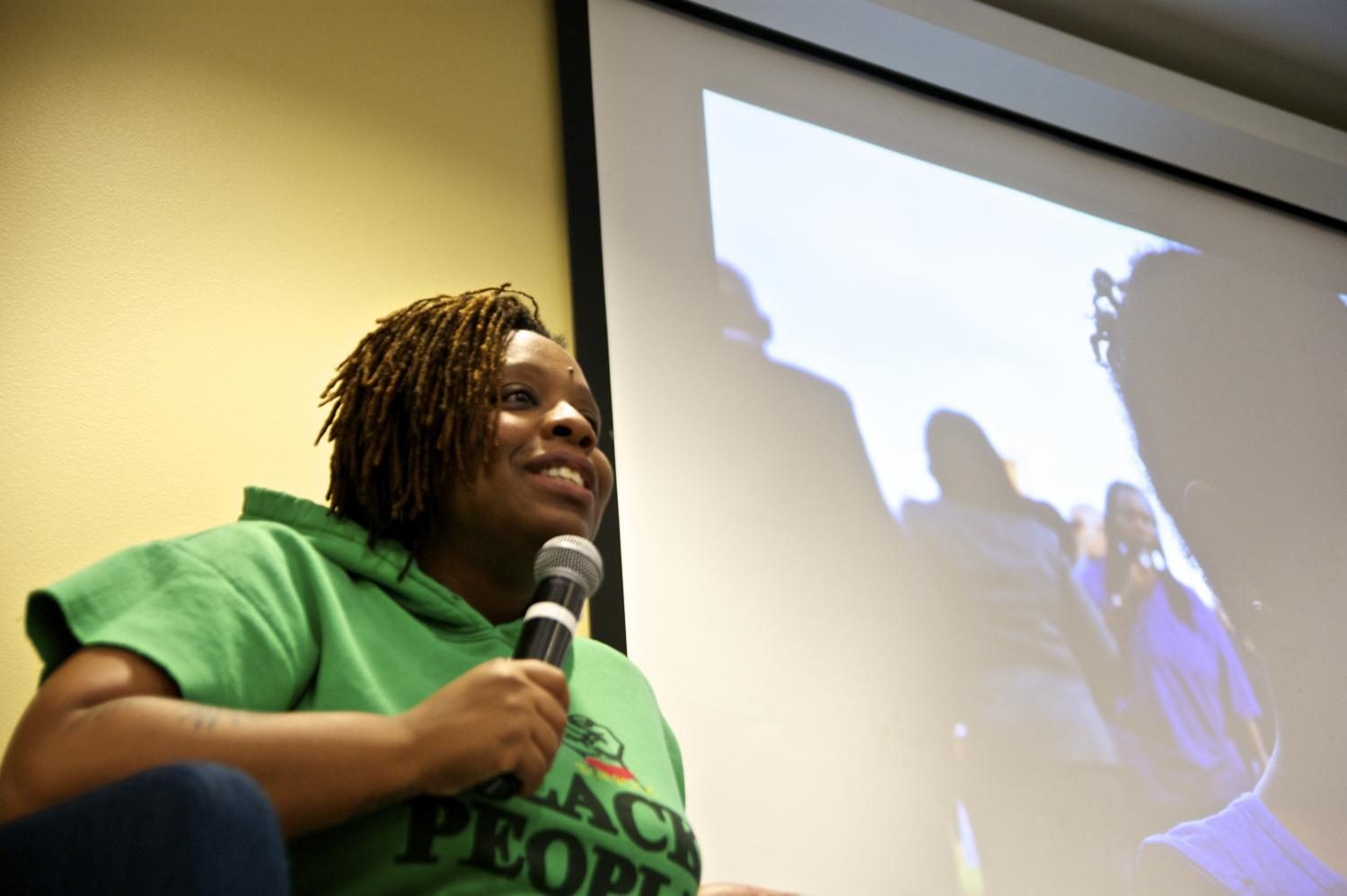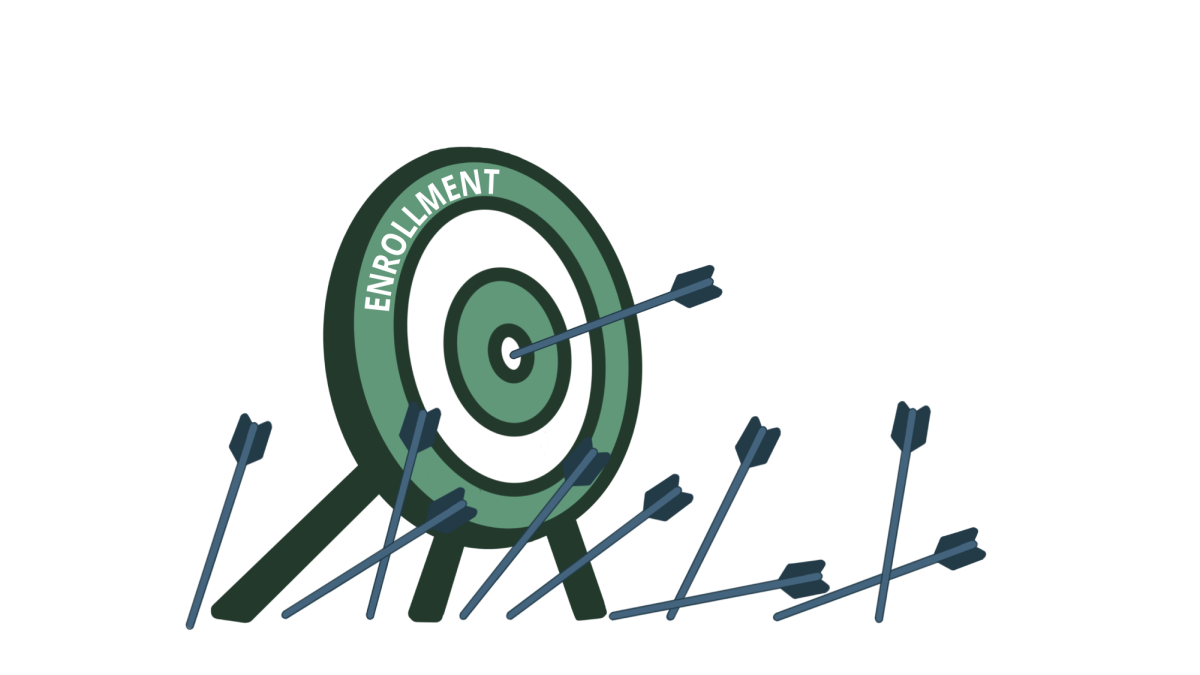#BlackLivesMatter Co-founder Encourages Students to Engage In Global Struggle
January 15, 2016
Patrisse Cullors, co-founder of the viral internet hashtag “#BlackLivesMatter” challenged American exceptionalism and discussed black liberation, global struggles and the role of students at a Kennedy Political Union sponsored event on Jan. 13.
The speaking event was cosponsored by The Darkening, Black Student Alliance (BSA), African Students Organization (ASO), Caribbean Circle, Latin American Students Organization (LASO), Student Advocates for Native Communities (SANC) and National Association for the Advancement of Colored People (NAACP) at AU.
Cullors began by addressing rumors of potential counter protests to her talk. She welcomed debate and for her dissenters to freely express their opinions but also stressed the importance of the event for black students.
“This is a time where particularly black people, black students are finally being seen, and so let’s not take that away from them,” Cullors said.
According to her, Black Lives Matter derived from a place of “rage, love, intervention” and a “call to action.” It all started in 2013 after George Zimmerman was acquitted of the murder of 17-year-old Trayvon Martin.
Even though Cullors considers herself an abolitionist and believes that the criminal justice system is not designed to actually serve justice, she truly thought that Zimmerman was going to be convicted.
“It was another sort of deepening at how sick and twisted this country is in its relation to black people,” Cullors said.
After the trial, Cullors felt inclined to find a “next step” on social media. She came across a post by the other Black Lives Matter co-founder Alicia Garza, which concluded with the words “Black Lives Matter.” Cullors put a hashtag in front of that phrase with the intention to make an impact. As a result, Black Lives Matter became both an online and offline project of organizing Black Lives Matter into a movement. According to Cullors, the more the project grew, the higher the murder rate of black people seemed to rise.
However, Cullors told the audience that Black Lives Matter wasn’t specifically about police killings, but also about targeting issues such as unemployment, homelessness and incarceration.
“Our movement is about the fight for black life, not just black death,” Cullors said.
Cullors also challenged American exceptionalism, expressing dissatisfaction with President Obama’s Jan. 12 State of the Union Address due to his notion that the United States is the best place to live and the freest country.
Cullors believes that the rhetoric of the American dream is a “fairy tale reality,” citing that 2.3 million people are incarcerated in the United States, one million of them being black Americans. Among those black people, many are women, both cisgender and transgender.
“The truth of the matter is,” Cullors said, “many of us in this country live in hell.”
Cullors questioned the true nature of the United States, from deportation and racist police brutality to environmental degradation and the struggle for reproductive rights, amongst a multitude of other issues.
Cullors herself has faced many struggles within her own family that she believes connects to the conditions of this country. Her brother was a drug addict and was diagnosed with schizoaffective disorder at age 19. According to Cullors, he spent most of his life living in a jail cell, forcing her to raise his son alongside Cullor’s mother. Her nephew’s mother, a former gang member, became addicted to meth after being shot and paralyzed from a drive-by shooting.
“The problem is we blame them,” Cullors said. “We blame poor people. We blame black people. We spend our whole lives blaming ourselves and spend very, very little time blaming the system.”
Cullors told the audience that she was not there to entertain, but instead to motivate students to organize. In the wake of what she considers to be a “new civil rights movement,” she encouraged the packed room of students to change their country and in turn change their world.
“This is the moment where we need a movement. We don’t need a Messiah; we don’t need an individual to save us. We need each other to save each other,” Cullors said.
Cullors explained that the conversation of Black Lives Matter isn’t just about young black boys and hopes to direct focus onto black women who have been murdered by law enforcement or vigilantes. Thus, “Black Lives Matter,” which originally emerged out of a place of intervention, turned into “declaration”, “rage” and the “shedding of light.” The movement is now international, with 31 chapters in North America, as well as in Canada and Ghana.
Cullors stressed that the movement was worldwide because black people exist everywhere, and therefore warned students not to isolate their struggle.
“It’s very easy to believe that our issue is the main issue as black people in America,” Cullors said.
She challenged the audience to remember that they are part of a “larger global struggle” and referenced the Black Panthers and Malcom X’s role in such struggles.
“The struggle in a lot of ways is against the U.S. Empire,” Cullors said.
Deeply grateful for American black activists like Harriet Tubman, Fannie Lou Hamer and Ella Baker, Cullors asked the audience to consider whom they were grateful for and who inspired them to attend this event.
She challenged the audience with two questions: “What have you done to save black lives?” and “What will you do?” She encouraged students to keep asking themselves those questions until they don’t have to ask anymore.
During the Question and Answer period, one student asked Cullors advice on how to unify people when building a movement. Cullors responded that organizing the masses can take a long time. She pointed to how Black Lives Matter wasn’t big during its inception in 2013 and didn’t go viral until the death of Mike Brown. Cullors advised students to gather a few people who are “amazing” and “brilliant,” instead of trying to get everyone involved.
“The work doesn’t happen in a student’s lifetime, it happens in your lifetime,” Cullors said.
Cullors is excited about the trajectory of civil rights movements. She explained that the Black Lives Matter movement has a vision of “radical black queer femme tradition,” which has allowed for marginalized groups such as black trans women to be in the forefront for once. This stands in contrast to the commonly praised “Christian male patriarch” in historical civil rights movements, such as Martin Luther King. According to Cullors, the evolution away from this norm is a step towards inclusivity.
“That’s what we have in this generation, and we should be proud of that,” Cullors said. “That’s an evolution. We evolved and we must continue to evolve because the next generation in 40 years is going to look completely different and we should embrace that and we should be excited about that.”



